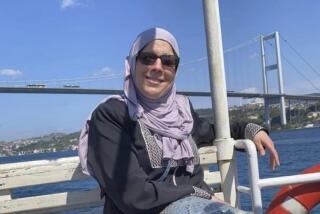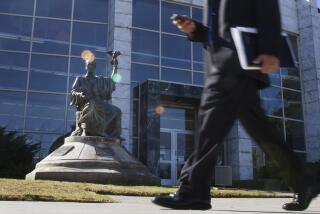Bail Denied Woman Accused of Conspiracy in 1980 Bomb Death
- Share via
LOS ANGELES — Calling Israel a “safe haven” to which Rochelle Manning might flee to evade trial in the United States, a federal judge Tuesday denied bail for the woman accused of helping prepare a mail bomb that killed a Manhattan Beach secretary in 1980.
Manning claims dual U.S.-Israeli citizenship and was carrying an Israeli passport when she stepped off a flight from Israel at Los Angeles International Airport two weeks ago and was arrested.
Federal authorities said they have linked both Manning and her husband, Robert Manning, to the 1980 bombing through fingerprints. Robert Manning, who is in Israel, is a suspect in a series of terrorist attacks on suspected Nazis and the murder of Arab-American activist Alex Odeh in Orange County in a bomb blast three years ago.
U.S. District Judge Terry J. Hatter Jr. said in court that Israel only rarely extradites its citizens to face criminal charges in the United States. He suggested that Israel might deny extradition, should Rochelle Manning flee there, based on political considerations.
‘Political Tinge’
“They could change it (an extradition request) in any fashion they chose,” Hatter said. “They could put a political tinge on it as several nations have done recently.”
An Israeli official in Los Angeles said that since 1977 his country has refused to extradite any Israeli citizen accused of a crime. Deputy Consul General Moshe Ram said Israeli law allows for trials of its citizens in Israel for crimes committed in the United States.
Before 1977, Ram said, he knows of no instance in which Israel refused an extradition request from the United States.
However, Assistant U.S. Atty. Nancy Wieben Stock argued at the bail hearing that more than 20 years have passed since Israel has honored a U.S. extradition request.
“We have not had an extradition from Israel of an Israeli citizen to face criminal charges in the United States since 1967,” Stock said.
At the hearing, Stock disclosed that at the time of her arrest Manning was carrying a typed document that contained a refusal to testify, citing both the First Amendment and the Fifth Amendment.
Stock suggested that the document had been prepared because Manning expected to be contacted by authorities and demonstrates “a certain level of paranoia with respect to the American justice system.”
Both Mannings Charged
The document reads in part: “I refuse to testify in accordance with my First and Fifth Amendment rights.
“(Under what grounds?) “On the ground that under the Fifth Amendment, anything I say may tend to incriminate me.”
Both Mannings are charged with conspiracy and mailing an explosive device that killed Patricia Wilkerson, a secretary at a Manhattan Beach computer firm. The package had been addressed to Wilkerson’s boss, according to federal prosecutors. Officials have not disclosed a motive in the crime.
According to the court file, fingerprints lifted from a brown cardboard box were not matched with those of Robert Manning until Feb. 8, 1988, and it was not until April 18 that prints from a letter accompanying the bomb were established as Rochelle Manning’s.
Also released Tuesday was a 1987 letter written by Robert Manning in which he accused the FBI and other federal agents of harassment, slander and false accusations of complicity in four 1985 crimes in which four persons died, including Odeh and two Boston policemen. Stock said Rochelle Manning was carrying that letter when she was arrested.
The letter, apparently mailed from Israel, was addressed to American Civil Liberties Union offices in New York.
In the letter, Robert Manning described himself as an Orthodox Jew who has been affiliated with a number of groups such as the Jewish Defense League. He acknowledged that he had once been convicted in California of using an explosive device and sentenced to three years’ probation.
He described heavy surveillance by law enforcement authorities during a monthlong trip to the United States in March, 1986, including court-ordered searches of his luggage and a subpoena to testify before a grand jury.
In Israel, Robert Manning said, U.S. agents interviewed friends and relatives and accused him of involvement in the 1985 crimes, which he denied. He claimed that agents told friends that he is not a Jewish activist but a paid criminal.
At the hearing Tuesday, Assistant U.S. Public Defender John P. Martin told Hatter that a combination of close surveillance, limited travel and surrender of her passports would assure that Rochelle Manning would not flee if released on bail. He suggested that one of her sisters would pledge her house to ensure that Manning would not flee, and he said Manning would never leave the country without her two young children, who were with her when she was arrested.
None of the arguments swayed Hatter.
“I think what we’d best do is get this matter quickly to trial so that if she is vindicated she can return to Israel,” Hatter said.
After the hearing, a woman who declined to give her name but said she is Robert Manning’s sister described her brother as “frightened” and said he has no intention of returning voluntarily to the United States.
More to Read
Sign up for Essential California
The most important California stories and recommendations in your inbox every morning.
You may occasionally receive promotional content from the Los Angeles Times.













